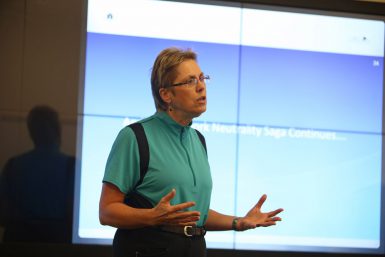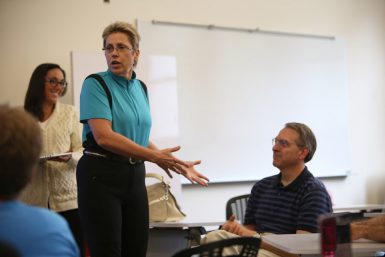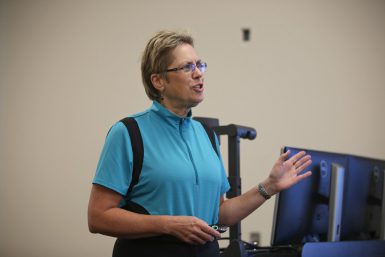Cherry outlines possible effects of election on net neutrality debate

The Federal Communications Commission has made significant decisions on network neutrality in the past few years, but more developments are forthcoming, according to professor Barbara Cherry.
Cherry presented “Network Neutrality and the 2016 U.S. Elections” as part of the Media School’s weekly research talk Oct. 14. Cherry, along with senior lecturer Matt Pierce and assistant professor Julien Mailland, has presented research on net neutrality past talks at the Media School.
This most recent talk recapped that information and updated the audience on more recent legal changes: the FCC’s February 2015 Open Internet Order, the D.C. Circuit Court of Appeals’ June 2016 upholding of the order, the impact the 2016 presidential and congressional elections will have on the future FCC Open Internet Rules, and policy developments of zero rating practices on Internet access service providers in both the U.S. and Canada.
Cherry started by outlining the uniqueness of net neutrality as a concept.
“Network neutrality is a public policy issue, and it does not have a distinct definition,” she said. “It’s more or less really an umbrella term that represents a diversity of goals, problems and potential remedies, all related to widespread deployment of broadband technology.”
Since it’s a legal issue, its classification of broadband internet access service affects the business models that providers are allowed to use. This classification is important because the FCC’s jurisdiction of powers depends on service classification, Cherry said.

The debate surrounds whether broadband internet access service is a telecommunications service under Title II or an information service under Title I. Cherry recounted a trip to Washington in September 2014 in which she, Pierce and Mailland raised questions and ideas of how to influence the development of policy alternatives.
“The Telecommunications Policy Research Conference is a major policy conference where people present papers, networking and meeting with people there,” Cherry said. “It was at the TPRC that Julien and I also presented a very specific paper about net neutrality—what we think ought to be done, and in particular why it does not raise First Amendment free speech problems for the FCC to intervene.”
In December 2014, Cherry and Jon Peha, a professor at Carnegie Mellon University, filed a paper with the FCC that outlined the analytical framework of technical and commercial functionalities for service classification. In 2015, the FCC adopted the Open Internet Order that classified broadband internet access service as a Title II telecommunications service. The Cherry-Peha paper was cited at least 10 times in the FCC’s ruling.
“I said, ‘yes, we got it!’ Cherry said. “We were so excited.”
Cherry and Mailland’s paper outlining why the order would not cause any constitutional problems also was cited in the ruling. As they summarized, carriers do not have First Amendment rights, so there was no First Amendment-related problem in restricting what common carriers could do, the FCC ruled.
The D.C. Circuit Court of Appeals upheld this order in its entirety in a two-to-one decision in June 2016.
“I was so pleased, because I was telling the FCC, ‘this is the way you need to do it,’” she said.
Future court rulings could depend on discretionary appeals, hearing from a full panel of judges rather than only three, Cherry said. Parties against the ruling have requested to re-hear the order with a panel en banc (with all judges). This type of hearing is rarely granted, but to request it is strategic, Cherry said, because it slows down the process of moving the request on to the U.S. Supreme Court.
Future legislation on the issue won’t be seen before the 2016 elections are over, said Cherry, and results will depend on which party wins as president and which controls the House and the Senate. Further FCC proceedings depend on the courts, elections and business practices, and whether or not further appeals are granted.

Cherry also explained zero rating, a data pricing plan that comes with a cap. It’s been a source of major controversy because it is, by definition, a form of a discrimination that affects competition in other markets. In the U.S., the FCC has the authority to review zero rating practices on a case-by-case basis, while in Canada, the Canadian Radio-television and Telecommunications Commission has issued a proceeding to examine these differential pricing practices.
Associate professor Andrew Weaver asked how Congress could potentially take action against the FCC ruling.
“If Congress wanted to do something to override what the FCC ruled, what would change the FCC’s jurisdiction?” he said. “Would they pass something that specifically addressed the broadband providers?”
Cherry said Congress could take action ranging from declaring that the FCC could not use its funding to enforce rules about network neutrality to maintaining the Title II classification, but disagreeing with elements of its implications and deciding that zero rating practices are allowable. Cherry pointed out that the FCC only exists because Congress created it, leaving Congress with considerable power over it and its very existence.
While much has been accomplished in making headway in these rulings, much could change in the future, particularly with the election ahead, said Cherry.
“The saga is continuing. I’m sure there’s going to be some future talk about what has happened now, after the latest election, but this is what policy is like. It’s on-going,” she said. “As major things happen, things can shake up.”
More:

